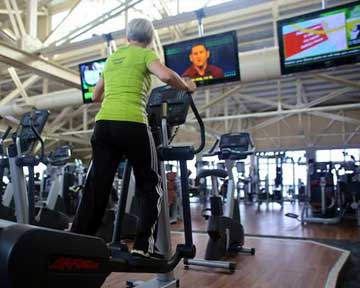What is osteochondritis dissecans?
Osteochondritis Dissecans is a condition that can affect almost any joint, but most frequently occurs in the elbow or knee. Where the joints are often exposed to intense repetitive motions under heavy load. The result is the separation of some cartilage tissue, occasionally bone too, from within the joint. Removed from any blood supply or nourishment, these free floating pieces become dead tissue within the joint capsule.
Although the freed tissue is inert, it can present a problem if it is pushed around the joint during normal movement. This can cause discomfort, pain and even wedge in the joint limiting its range of movement. In severe cases surgery may be required to alleviate pain and free the joint.
It is important to note that Osteochondritis Dissecans differs from normal cartilage damage, which if it remains partially intact, will heal over time. Unlike other forms of cartilage damage that have a clear cause, often as a result of direct trauma, Osteochondritis Dissecans is likely the result of multiple affects. These are thought to include genetic predisposition, direct trauma, abnormal ossification and ischemia. Biomechanical abnormalities could lead to acute repetitive trauma or cause laxity in the ligaments supporting the joint. It has also been considered that osteochondritis dissecans in adults is an undiagnosed disease that persists from childhood, when the growing epiphyseal cartilage plates were still open.
What causes osteochondritis dissecans?
The exact cause of osteochondritis dissecans is not known. It may be related to repetitive trauma (multiple episodes of unrecognized injury that damage the bone and cartilage). There may also be a genetic component involved, making some people more prone to develop this condition.
Osteochondritis is most often found in adolescents ages 10 – 18 and is commonly associated with certain sports, including gymnastics and baseball (pitching).
What are the symptoms of osteochondritis dissecans?
Some common symptoms of osteochondritis dissecans are:
- Joint pain, particularly during movement.
- Popping and cracking noises from the joint during movement.
- Stop/start catching sensation when moving the joint.
- Range of movement in the joint is reduced.
- Sensation of resistance or even locking when moving the joint.
- Joint is tender when held or moved.
- Swelling within the joint and surrounding tissues.
How is osteochondritis dissecans Diagnosed?
Osteochondritis dissecans would be diagnosed by your doctor through physical examination of the affected joint and the use of X-ray or MRI imaging. As this condition manifests within the joint the external signs can be quite subtle, making the client's account of their symptoms important for diagnosis. Only when an X-ray or MRI is taken would the extent of the cartilage damage be revealed.
For more information on how physiotherapy can help treat osteochondritis dissecans, or to book an assessment, please email office@liverpoolphysio.co.uk or call 0151 558 0077.
What would a physiotherapy assessment for osteochondritis dissecans involve?
At Liverpool Physio, we want to gain as much information as possible about your injury to ensure we give you the best treatment. In your first appointment with us, our physiotherapists will carry out an assessment which has two parts:
Subjective
A discussion between you and our physiotherapist to find out the cause of your injury and what symptoms you are experiencing, and how your injury is affecting you and your lifestyle.
Objective
An assessment of your range of pain, range of movement, and a series of special tests to identify the presence of any tear or separation to the cartilage. If you do not have an official diagnosis before your initial assessment then our physiotherapist may refer you to have X-rays or a MRI scan.If you have a complete cartilage tear you may require surgery to repair it. In this case, our physiotherapists would be happy to see you for assessment and treatment after your surgery to help you recover.
What would physiotherapy treatment for Tendonitis involve?
The treatment for osteochondritis dissecans occurring in the elbow will vary depending on the severity of the tear or debridement, the client???s age and activity level or if a surgical intervention is deemed necessary. At Liverpool Physio a non-surgical conservative approach to treatment, applied by our physiotherapists, could include;
- Resting the affected elbow joint.
- Ice treatment to relieve swelling and pain
- Electrotherapy to stimulate deep tissue healing.
- Gentle mobility exercises to alleviate stiffness and reduce swelling
- Isometric exercises to maintain strength and relieve stiffness.
- Progressive strengthening exercises as you regain full range of movement.
- Functional exercises to aid return to normal daily tasks
- We are also happy to give advice on activity modification
- Target exercises to return safely to sports.
At Liverpool Physio you will experience a personalised treatment session. Each appointment will be aimed at returning to your everyday activities and what you enjoy. In cases where a client???s symptoms persist despite rest, activity modification and physiotherapy, you may be referred for surgical intervention. There are several different methods of correcting the cartilage depending on the severity of the damage revealed. The surgeon may insist of a period of limited mobility following surgery to allow for the initial stages of healing. Physiotherapy would then play a major role in rehabilitating the client to normal functional use of the elbow. Treatment could include ice therapy, compression, and gentle mobilisations, then as full recovery is achieved stretching and strengthening exercises.
How can I arrange a physiotherapy assessment for osteochondritis dissecans?
If you are experiencing pain, swelling or a restriction in the normal movement at your elbow, one of our experienced physiotherapists will be happy to see you for an assessment.
You can contact us directly to arrange an assessment and we can advise you if further treatment is recommended, or give you details on self-management for minor cases. To arrange an appointment please email office@liverpoolphysio.co.uk or call 0151 558 0077.
Summary
Osteochondritis dissecans can be a painful condition that limits range of movement, impacting on normal activities and participation in sports.
At Liverpool Physio we want to ensure you get the best treatment for your injury and we will use pain and swelling relief techniques, strengthening exercises and activity specific treatments to help you recover.
For more information on how physiotherapy can help treat osteochondritis dissecans, or to book an assessment, please email office@liverpoolphysio.co.uk or call 0151 558 0077.
↑ Back to top
















